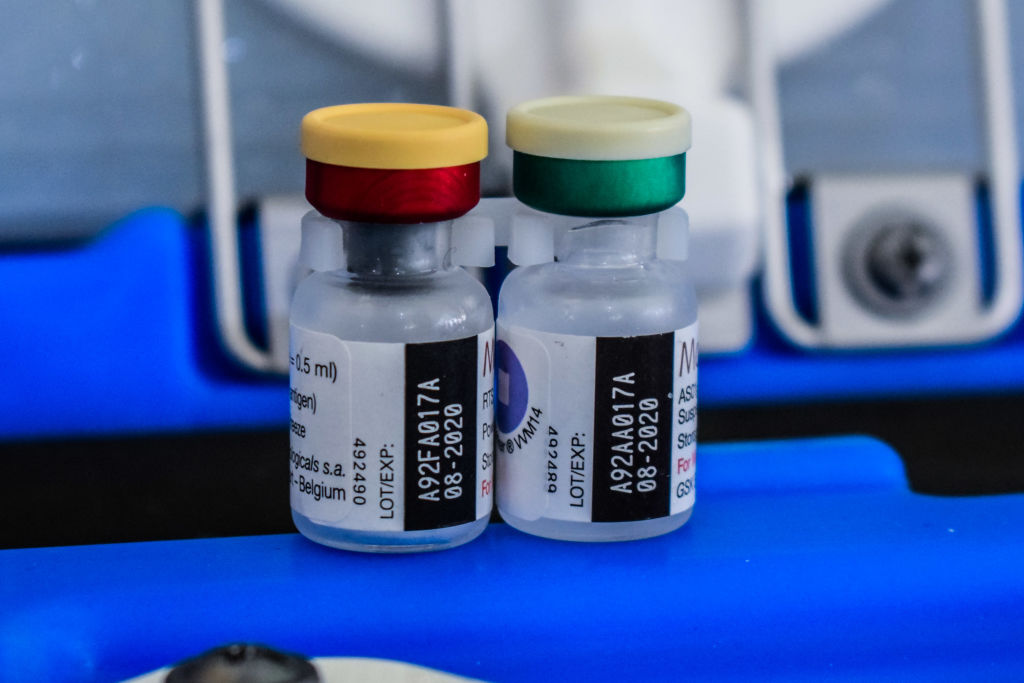Study suggests new approach to fighting malaria reduces severe illness and deaths in kids


A free daily email with the biggest news stories of the day – and the best features from TheWeek.com
You are now subscribed
Your newsletter sign-up was successful
Researchers conducting a malaria trial in Burkina Faso and Mali found that when children received both seasonal vaccinations and antimalarial drugs, rather than just one intervention, there was a 70 percent drop in hospitalizations and deaths related to the disease, The Guardian reports.
Their study was published Wednesday in The New England Journal of Medicine. Malaria is a mosquito-borne disease, and in 2019, 94 percent of cases and deaths were reported in Africa. The most vulnerable group is children 5 and under — in 2019, they accounted for 67 percent of malaria deaths worldwide, the World Health Organization said.
The trial, led by a team from the London School of Hygiene and Tropical Medicine, followed 6,000 children between five and 17 months living in Burkina Faso and Mali. The study lasted three years, with the children receiving a malaria vaccine known as RTS,S and four courses of antimalarial medications annually during the time of highest transmission: the rainy season. Researchers found that this combination of a vaccine and antimalarial drugs, compared to just the vaccine, reduced hospitalizations by 70.5 percent and death by 72.9 percent.
The Week
Escape your echo chamber. Get the facts behind the news, plus analysis from multiple perspectives.

Sign up for The Week's Free Newsletters
From our morning news briefing to a weekly Good News Newsletter, get the best of The Week delivered directly to your inbox.
From our morning news briefing to a weekly Good News Newsletter, get the best of The Week delivered directly to your inbox.
Daniel Chandramohan, the study's co-lead author, told The Guardian the results of the trial "were much more successful than we had anticipated. Our work has shown a combination approach using a malarial vaccine seasonally — similar to how countries use influenza vaccine — has the potential to save millions of young lives in the African Sahel. Importantly, we didn't observe any new concerning pattern of side effects."
A free daily email with the biggest news stories of the day – and the best features from TheWeek.com
Catherine Garcia has worked as a senior writer at The Week since 2014. Her writing and reporting have appeared in Entertainment Weekly, The New York Times, Wirecutter, NBC News and "The Book of Jezebel," among others. She's a graduate of the University of Redlands and the Columbia University Graduate School of Journalism.
-
 The 8 best TV shows of the 1960s
The 8 best TV shows of the 1960sThe standout shows of this decade take viewers from outer space to the Wild West
-
 Microdramas are booming
Microdramas are boomingUnder the radar Scroll to watch a whole movie
-
 The Olympic timekeepers keeping the Games on track
The Olympic timekeepers keeping the Games on trackUnder the Radar Swiss watchmaking giant Omega has been at the finish line of every Olympic Games for nearly 100 years
-
 Rubio boosts Orbán ahead of Hungary election
Rubio boosts Orbán ahead of Hungary electionSpeed Read Far-right nationalist Prime Minister Viktor Orbán is facing a tough re-election fight after many years in power
-
 Key Bangladesh election returns old guard to power
Key Bangladesh election returns old guard to powerSpeed Read The Bangladesh Nationalist Party claimed a decisive victory
-
 Epstein files topple law CEO, roil UK government
Epstein files topple law CEO, roil UK governmentSpeed Read Peter Mandelson, Britain’s former ambassador to the US, is caught up in the scandal
-
 Iran and US prepare to meet after skirmishes
Iran and US prepare to meet after skirmishesSpeed Read The incident comes amid heightened tensions in the Middle East
-
 EU and India clinch trade pact amid US tariff war
EU and India clinch trade pact amid US tariff warSpeed Read The agreement will slash tariffs on most goods over the next decade
-
 Israel retrieves final hostage’s body from Gaza
Israel retrieves final hostage’s body from GazaSpeed Read The 24-year-old police officer was killed during the initial Hamas attack
-
 China’s Xi targets top general in growing purge
China’s Xi targets top general in growing purgeSpeed Read Zhang Youxia is being investigated over ‘grave violations’ of the law
-
 Panama and Canada are negotiating over a crucial copper mine
Panama and Canada are negotiating over a crucial copper mineIn the Spotlight Panama is set to make a final decision on the mine this summer
